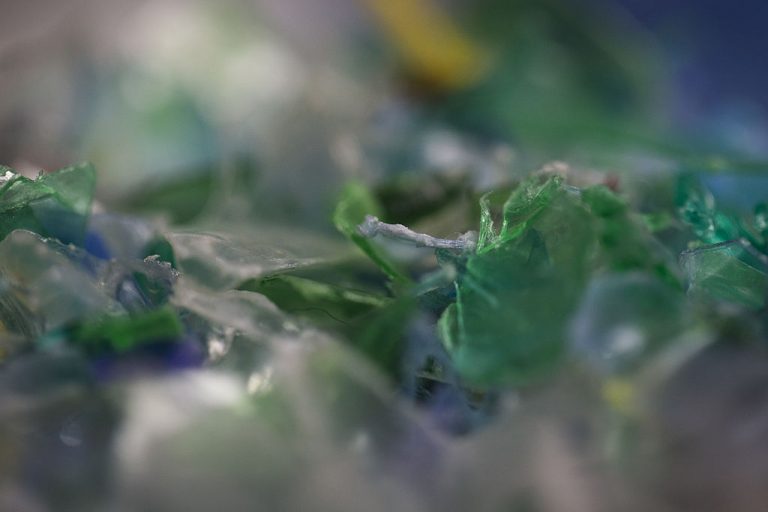Scientists reveal that human beings are digesting five grams, which weighs about as much as one credit card, in plastic micro and nanoparticles on average per week amidst a pandemic of plasticization of the human body that may have dire consequences.
A research team of the Medical University of Vienna arrived at this remarkable conclusion based on its studies on the absorption of plastic micro and nanoparticles (MNP) in the gastrointestinal tract.
The study, published in Exposure and Health on March 22, shows that MNPs are also likely to affect the gut flora and fauna, which scientists ascribe to syndromes associated with gestation, such as obesity, diabetes, and liver failure.
Microparticles range from 0.001 to 5 millimeters, while nanoparticles encompass sizes below that range. If small enough, researchers say, the particles may end up in organs, tissues, the blood stream, and eventually cross the blood-brain barrier and enter the nervous system.
Tissue
It is not known how much of the weekly-consumed credit cards, amounting to both measurable and non-measurable quantities, are able to make it through the intestinal wall and end up in the organs and tissues.
Success
You are now signed up for our newsletter
Success
Check your email to complete sign up
We do know, however, that vast amounts of particles have shown up in human tissues, especially in the bowels. Scientists believe this phenomenon has a negative impact on biochemical chain reactions and can produce carcinogens, infertility, cardiovascular disorders, and neurological problems.
READ MORE:
- Worldwide Chemical Pollution Has Exceeded ‘Safe Operating Space’ for Human Life: Study
- This Sea Creature Has a Surprisingly Simple Solution to One of the Ocean’s Greatest Threats: Microplastics
Lukas Kenner of MedUni Vienna says people suffering from chronic diseases are most at risk: “A healthy gut is more likely to ward off the health risk. But local changes in the gastrointestinal tract, such as those present in chronic disease or even negative stress, could make them susceptible to the harmful effects of MNPs.”
Organs
Furthermore, MNPs have also been observed in other human tissues and organs, scientists from Arizona State University presenting at the American Chemical Society’s online fair highlighted.
The team isolated samples from human organs such as the lungs, spleen, kidney, and liver, finding considerable amounts of polycarbonate, polyethylene terephthalate, and polyethylene, some of the basic components or polymers that make up plastics.
Furthermore, the study showed that huge amounts of bisphenol A, particularly notorious for its adverse cardiovascular health effects, were found.
Blood
Researchers stated that people are under perpetual siege by MNPs and are invaded by microplastics through the gestational tract by the seafood and sea salt we consume, the water we drink, and packaging. At the same time, we inhale airborne particles when we breathe and through skin contact when we use cosmetics and wear our clothes.
So far, scientists only assumed plastic nanoparticles would also be present in human blood, but hadn’t been able to identify quantifiable amounts of MNPs to substantiate that suspicion.
However, recently, researchers of the Vrije University in Amsterdam in the Netherlands established measurable amounts of polymers like polyethylene terephthalate (PET), polyethylene, and polymers of styrene in prepared blood samples.
The researchers concluded that three out of four test subjects showed plastics in their blood. They also positively affirmed the presence of propylene, albeit in quantities (or sizes) too small to measure.
“Our study is the first indication that we have polymer particles in our blood – it’s a breakthrough result,” Prof Dick Vethaak, an ecotoxicologist, said. “But we have to extend the research and increase the sample sizes, the number of polymers assessed, etc.,” Vethaak added.
Water
Despite its status as a healthy alternative to soft drinks, bottled water also contributes to amassing enormous amounts of plastics and additives derived from their packaging into our bodily system.
Researchers from Orb Media at the State University of New York in Fredonia figured out that people who consume the recommended amount of 1.5 daily liters of bottled water will be infused with 90,000 plastic MNP per year—all particles sizable enough that their presence could be measured.
Xenohormones are substances that mimic estrogenic qualities and are believed to be responsible for causing cancer and fertility problems.
Several studies also pointed out the presence of xenohormones, plasticizers and other harmful substances like arsenic that had leeched from the packaging.















